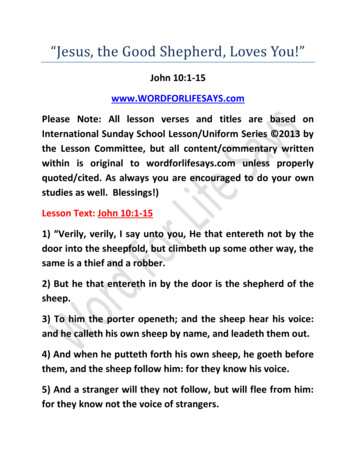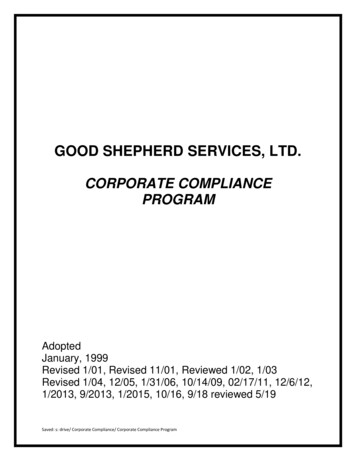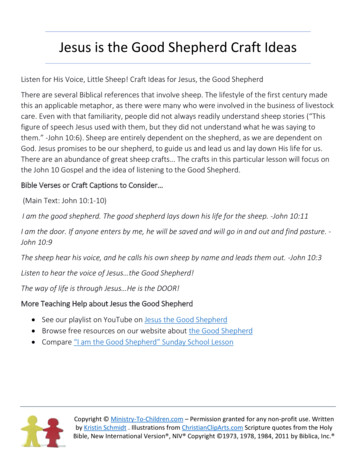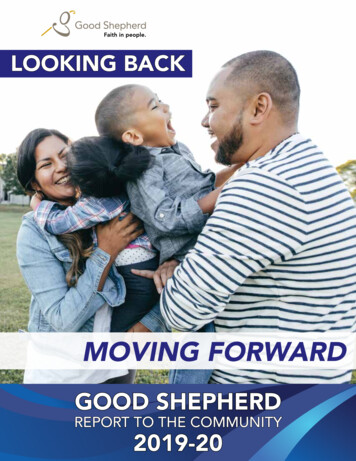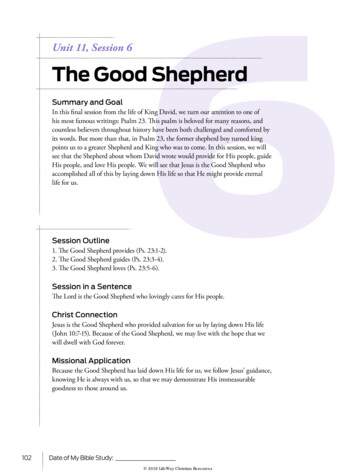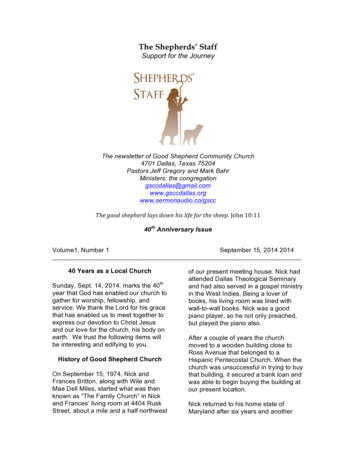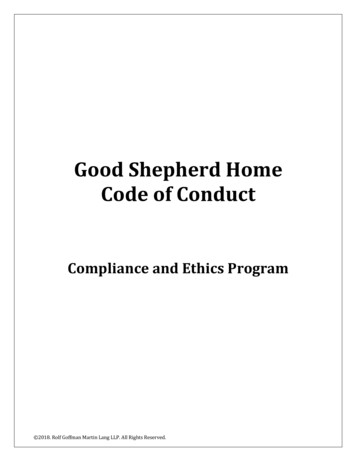
Transcription
Good Shepherd HomeCode of ConductCompliance and Ethics Program 2018. Rolf Goffman Martin Lang LLP. All Rights Reserved.
TABLE OF CONTENTSOUR COMPLIANCE CULTURE. 3CODE OF CONDUCT . 5REPORTING & RESPONSE . 6COMPLIANCE POLICIES . 9ETHICAL BUSINESS PRACTICE. 10BILLING . 12COST REPORTING. 14EMPLOYEE SCREENING. 15GIFTS & KICKBACKS . 16RESIDENT RIGHTS . 18QUALITY OF CARE. 19RECORDS & DOCUMENTATION . 20GOVERNMENT RELATIONS . 21PHYSICIAN AGREEMENTS . 22HOSPICE. 23CONFIDENTIALITY . 24TRANSPARENCY & RESIDENT CHOICE . 25EDUCATION . 26MONITORING . 27ENFORCEMENT & DISCIPLINE. 28COMPLIANCE OVERSIGHT . 29 2018. Rolf Goffman Martin Lang LLP-ii of 29-Compliance and Ethics Program Manual
OUR COMPLIANCE CULTURECommitment to ComplianceGood Shepherd Home is committed to operating its business in an honest, ethical, and legal manner. There are manylaws and regulations governing Good Shepherd Home’s operations, and Good Shepherd Home strives to comply withall of them. Good Shepherd Home also endeavors to be a good corporate citizen and to act ethically in its dealings withvendors, referral sources, competitors, and others.Good Shepherd Home strives to foster a culture of compliance within its organization, such that all employees, agents,and contractors will “live” compliance when carrying out their responsibilities on behalf of Good Shepherd Home. GoodShepherd Home recognizes that compliance is a cooperative effort, and that it cannot meet its high standards withoutthe support and assistance of its employees, agents, and contractors.1 Good Shepherd Home expects its employees tocontribute to its compliance culture by recognizing and doing “the right thing.”This Compliance and Ethics Program Manual (CEPM) formalizes Good Shepherd Home’s commitment to complianceby establishing Good Shepherd Home’s standards of conduct, as well as policies and procedures regarding compliancewith applicable laws. This CEPM is intended to apply, where applicable, to all relationships between Good ShepherdHome and other health care providers, vendors, and suppliers. This CEPM also reaffirms Good Shepherd Home’scommitment to the delivery of quality health care consistent with applicable State and Federal health and safetystandards.OversightGood Shepherd Home has appointed a Compliance Officer2 and has a compliance committee3 charged with theresponsibility of developing, operating and monitoring its compliance and ethics program (CEP). The ComplianceOfficer and his/her committee report directly to Good Shepherd Home’s governing body on compliance matters.Questions regarding the application of this CEPM may be directed to the Compliance Officer.Employee EducationEmployees will receive annual education regarding compliance and should be familiar with the laws governing theirjob responsibilities and the matters set forth in this CEPM.Reporting of ViolationsAn important goal of Good Shepherd Home in fostering its compliance culture is that all employees feel comfortablereporting to Good Shepherd Home any inappropriate activity. In fact, all employees have an obligation to reportviolations, suspected violations, questionable conduct, or questionable practices in accordance with the reportingmechanisms established in this CEPM. Retaliation against any employee for reporting is strictly prohibited.Because Good Shepherd Home believes that compliance is a cooperative effort, Good Shepherd Home has adopted achain of command approach with respect to compliance reporting and response. That is, all employees are expected toreport suspected violations to their immediate supervisor. Assuming that the issue is within the supervisor’s area ofexpertise, the supervisor will determine the appropriate response. If a supervisor needs assistance, the supervisor canreport the potential violation “up the chain” to his supervisor for additional input. Further reports up the chain may benecessary in the event of significant compliance issues.Indeed, we use the term “employees” through this CEPM for ease of reference, but obligations, training, discipline,and other policies in this CEPM also apply to our employees, agents, contractors, and volunteers, as applicable.1Note that only those organizations with five or more SNFs are required to have a designated “Compliance Officer”pursuant to the Requirements of Participation. However, we believe that it is appropriate for even smallerorganizations to designate an individual as a “Compliance Officer” so that the individual responsible for oversight ofthe program is clear. The Office of Inspector General (“OIG”) Compliance Program Guidance for Nursing Facilities alsoidentifies having a designated Compliance Officer as one of its seven elements of an effective compliance program.2Similarly, while the Requirements of Participation for SNFs do not specifically require a compliance committee, theOIG Compliance Program Guidance for Nursing Facilities also identifies the compliance committee (along with theCompliance Officer) as one of the seven elements of an effective compliance program.3 2018. Rolf Goffman Martin Lang LLP-3 of 29-Compliance and Ethics Program Manual
Good Shepherd Home recognizes that situations may arise where an employee does not feel comfortable reporting tohis supervisor, or an employee may be concerned that his supervisor will not address the issue. Because Good ShepherdHome does not wish for these concerns to deter employees from reporting legitimate compliance concerns, GoodShepherd Home has also developed mechanisms for employees to report issues anonymously and/or directly to theCompliance Officer. To report anonymously Good Shepherd has put 2 mechanisms in place.1.) Call: 1-844-664-14252.) Web portal: goodshepherdhome.ethicspoint.comContinuous ImprovementWe appreciate your contributions to Good Shepherd Home’s compliance culture. If you have any thoughts about howwe can improve our CEP, please share them. Good Shepherd Home always welcomes your comments, questions,concerns, and suggestions. 2018. Rolf Goffman Martin Lang LLP-4 of 31-Compliance and Ethics Program Manual
1.0CODE OF CONDUCTWe will not lie, cheat, steal, harm others, or tolerate those who do.OGood Shepherd Home requires that every person and every company working with Good Shepherd Home conduct theirbusiness ethically and in compliance with the law. Good Shepherd Home considers its standards to apply toindependent contractors, volunteers and vendors in addition to its employees, and Good Shepherd Home will judgewhether to continue its relationships based on compliance with these standards.Good Shepherd Home believes that if those individuals and companies working with Good Shepherd Home abide bysome general principles, they will be able to meet Good Shepherd Home’s standards for compliance:Follow Our Policies. Good Shepherd Home is required to abide by a large number of laws andregulations because of the nature of the services that we provide. These laws will be manifested through ourpolicies and the training and in-services in which you will be expected to participate. Good Shepherd Homecan face serious consequences for failure to abide by the law. Therefore, Good Shepherd Home expects thatall policies will be followed.Do the Right Thing. While the right thing is not always the easy thing, you most likely know what it iswithout having to be told. Good Shepherd Home expects that its employees will work hard and diligently onbehalf of Good Shepherd Home and perform to the best of their abilities. Good Shepherd Home also expectsits employees to be honest, trustworthy, and respectful.Follow the Golden Rule. Treat others as you would want them to treat you. Treat others with respectand dignity. Never harm another person or allow them to be harmed while they are in your care.We expect every person and company working with Good Shepherd Home to report any violations of our code ofconduct to us immediately.The most important thing is to report – the method of reporting is less important. We have adopted numerous waysfor people to bring concerns to our attention: if you are an employee: tell your supervisor; if you are a contractor:inform your primary contact at Good Shepherd Home; or use one of our numerous official reporting mechanisms todirectly notify the Compliance Officer.OThis code of conduct is a variation of the West Point Cadet Honor Code. 2018. Rolf Goffman Martin Lang LLP-5 of 31-Compliance and Ethics Program Manual
2.0REPORTING & RESPONSE2.1 Reporting Suspected Violations and InquiriesGood Shepherd Home believes that a CEP functions best when all employees assist in promoting compliance withintheir own area of expertise. To take advantage of the different competencies and knowledge within its organization,Good Shepherd Home has adopted a chain of command approach to compliance reporting and inquiries regardingpotential compliance issues.All employees are required to report violations, suspected violations, questionable conduct, or questionable practicesof which they become aware to their immediate supervisors (or directly to the Compliance Officer, if preferred). If theemployee’s immediate supervisor does not have the necessary knowledge to respond to a report or inquiry, thesupervisor may, in turn, move the issue another rung up the chain by reporting to his supervisor. Reports and inquiriesare to be moved further up the chain of command, and all the way to the Compliance Officer, as necessary, until theindividual with the appropriate expertise is reached and can respond to the report in accordance with Section 2.3.Further reports up the chain may also be necessary in the event of significant compliance issues.Good Shepherd Home believes that the majority of compliance issues may be appropriately handled through the chainof command approach, as supervisors can report issues up the chain to the Compliance Officer as appropriate.However, in the event an employee does not wish to report to his or her supervisor (e.g., the supervisor is implicatedin the potential wrongdoing, the employee is concerned that the supervisor will not respond to a report), GoodShepherd Home has established alternate procedures for reporting. First, the employee may choose to “skip” a leveland make the report to the next supervisor in the chain of command. Alternately, the employee may report directly tothe Compliance Officer, in writing at 725 Columbus Ave, Fostoria, Ohio 44830, by filing a report through Good ShepherdHome’s toll-free fraud and abuse hotline 1-844-664-1425, or by reporting through Good Shepherd Home’s securecompliance website goodshepherdhome.ethicspoint.com.Good Shepherd Home is committed to fostering a compliance culture where all employees feel comfortable and areproactive in reporting potential violations directly to their supervisors. Good Shepherd Home strictly prohibits anyretaliation or discrimination against employees for reporting potential compliance violations, and it may be moredifficult for Good Shepherd Home to investigate and resolve reports if it is unable to communicate with thecomplainant. However, because Good Shepherd Home does not wish for inappropriate activity to go unreported forany reason, employees are always free to report potential violations to the Compliance Officer anonymously.Please note that there may be additional reporting obligations for certain compliance violations under the lawsgoverning the operation of nursing facilities. Employees are also required to comply with these reporting obligations,which are addressed in other policies and procedures of Good Shepherd Home. For example, employees must reportresident abuse to the Administrator in accordance with Good Shepherd Home’s abuse policies and procedures.2.2Reporting GuidelinesThe following guidelines shall apply to all reports made pursuant to this CEPM:A. No Retaliation. Good Shepherd Home prohibits any retaliatory action against an employee for making any verbalor written compliance communication in good faith to his or her supervisor, the compliance hotline, an anonymousdrop box, the Compliance Officer, or to any government agency.B. Discipline. There will be discipline or other consequences for failure to report timely and thoroughly. Prompt andcomplete disclosure may be considered a mitigating factor in determining an employee's discipline or sanction ifthey are the wrongdoer. The discipline or sanction shall not be increased because an employee reported his or herown violation or misconduct. 2018. Rolf Goffman Martin Lang LLP-6 of 31-Compliance and Ethics Program Manual
C. Interference with Reporting. No employee shall attempt to prevent any person from making a compliancereport. If an employee does try to prevent a person from making a report, then that employee shall be subject todisciplinary action, which may include termination.2.3 Supervisor ResponseWhen a report of a suspected violation of the policies in this CEPM is brought to the attention of a supervisor, thesupervisor will assess the issue and conduct a reasonable investigation to determine whether a violation has occurredand whether a significant compliance issue has been raised. Supervisors will exercise discretion regarding whether asuspected violation is so significant to report to the Compliance Officer, but will generally err on the side of reporting.Generally, systemic issues, issues that involve questions of ethical business practices, provision of care by an unlicensedor excluded individual, and/or legal or billing violations should be reported to the Compliance Officer.If a significant compliance issue has been raised, the supervisor will report the issue directly to the Compliance Officerfor investigation and response. If the supervisor determines that a violation has occurred, but does not require theassistance of the Compliance Officer, the supervisor may determine the appropriate response, such as recommendingdisciplinary action, providing employee training, or correcting a billing error.If a supervisor needs direction or has a question regarding how to respond to a report of suspect activity, the supervisormay take his or her inquiry to the next supervisor in the chain of command.2.4 Compliance Officer ResponseWhen a report of a suspected violation of the policies in this CEPM is brought to the attention of the Compliance Officer,the following steps shall be followed:A. Initial Assessment. The Compliance Officer will determine whether the report raises compliance issues. Often,reports that are made to the Compliance Officer through reporting mechanisms involve Human Resources issues,and not compliance issues. The Compliance Officer can redirect Human Resources complaints to the appropriateindividual.B. Investigation & Report. If a compliance issue is raised, the Compliance Officer will investigate the suspectedviolation or questionable conduct, and/or shall delegate the investigation or analysis of suspected violations orquestionable conduct to any individual(s) he or she deems appropriate. A report regarding such inquiry shall beprepared. The report, at a minimum, shall address: 1) the allegation that has been made; 2) the specific stepsand/or methods used in investigating the matter (such as people interviewed, records reviewed, analysesperformed, etc.); 3) the specific findings and/or results of the investigation; and 4) a proposed plan of action (suchas disciplinary action, policy or procedure changes, in-service training regarding existing policy and/or procedure,or other suggested actions) to prevent future non-compliance.If the issue raised is not a compliance issue but requires additional attention, the Compliance Officer will refer theissue to the appropriate person for follow-up.C.Post-Investigation Assessment & Referral to Compliance Committee. If, after the investigation, theCompliance Officer believes that a significant compliance issue has been raised, then the report will be forwardedto the Compliance Committee for review, and a determination of how it believes the allegation should be addressed.The Compliance Committee’s proposed disposition of a violation may include, but is not limited to, contacting LegalCounsel, revising the CEPM, conducting educational inservices for staff, instituting disciplinary action, reportingthe violation to the appropriate authorities, repayment of funds, and/or making a monetary restitution to affectedthird parties.D. Response. Based on the results of the investigation by the Compliance Officer, and taking into consideration anyother suggestions by the Compliance Committee, the Administrator, Compliance Officer, or other appropriatelydesignated party will take appropriate corrective and/or disciplinary action, or will recommend such action to theBoard of Directors, if necessary. The response should also take into consideration how to prevent further similar 2018. Rolf Goffman Martin Lang LLP-7 of 31-Compliance and Ethics Program Manual
violations, including any necessary modification to Good Shepherd Home’s CEP to prevent and detect criminal, civiland administrative violations under the Social Security Act.E.Storage of & Access to Compliance Files. The Compliance Officer shall place all files regarding compliancematters in a secure location. Access to files will be provided only to the Compliance Officer, Legal Counsel, CEO,and authorized members of the Board of Directors. 2018. Rolf Goffman Martin Lang LLP-8 of 31-Compliance and Ethics Program Manual
3.0COMPLIANCE POLICIESAs part of its commitment to compliance with the law, Good Shepherd Home has established policies and procedureswhich spell out the steps that employees must take to maintain compliance in several areas of risk for nursing facilities.3.1Ethical Business Practice3.2Billing3.3Cost Reporting3.4Employee Screening3.5Gifts & Kickbacks3.6Residents’ Rights3.7Quality of Care3.8Recordkeeping & Documentation3.9Government Relations3.10 Physician Agreements3.11 Hospice Referrals3.12 Confidentiality3.13 Transparency & Resident Choice 2018. Rolf Goffman Martin Lang LLP-9 of 31-Compliance and Ethics Program Manual
3.1ETHICAL BUSINESS PRACTICEPOLICYEmployees are expected to conduct themselves so as to avoid actual impropriety and/or the appearance of improprietyin making business decisions. Employees may not use their positions at Good Shepherd Home to profit personally orto assist others in profiting in any way at the expense of Good Shepherd Home, or its residents.Employees shall disclose to their supervisor and to the Compliance Officer any financial interest, ownership interest,or any other relationship they (or a member of their immediate family) have with Good Shepherd Home’s residents,vendors, or competitors.PROCEDUREA. Services for Competitors or Vendors. No employee shall perform work or render services for any competitorof Good Shepherd Home or for any organization with which Good Shepherd Home does business, or which seeksto do business with Good Shepherd Home, without the approval of his/her supervisor. No employee shall be adirector, officer, or consultant of an outside organization, nor permit his/her name to be used in any fashion thatwould tend to indicate a business connection with such organization without the prior approval of the employee’ssupervisor.B. Stealing Information. Good Shepherd Home employees shall not steal information belonging to another personor entity, including from Good Shepherd Home, or use any publication, document, computer program, informationor product in violation of a third party’s interest in such product. All Good Shepherd Home’s employees areresponsible for ensuring that they do not improperly copy for their own use documents or computer programs inviolation of applicable copyright laws or licensing agreements. Employees shall not use confidential businessinformation obtained from competitors, including customer lists, price lists, contracts or other information inviolation of a covenant not to compete, prior employment agreements, or in any other manner likely to provide anunfair competitive advantage to Good Shepherd Home.C.Use of Insider Information. Employees may not use “insider” information for any business activity conductedby or on behalf of Good Shepherd Home. All business relations with contractors must be conducted at arm’s lengthboth in fact and in appearance, and in compliance with Good Shepherd Home’s policies and procedures. Employeesmust disclose personal relationships and business activities with contractor personnel that may be construed byan impartial observer as influencing the employees’ performance or duties. Employees have a responsibility toobtain clarification from management on questionable issues that may arise.D. Financial Reporting. All financial reports, cost reports, accounting records, research reports, expense accounts,time sheets and other documents must accurately and clearly represent the relevant facts or the true nature of atransaction. Improper or fraudulent accounting, documentation or financial reporting is contrary to the policy ofGood Shepherd Home and may be in violation of applicable laws.E.Travel & Entertainment. It is Good Shepherd Home’s policy that an employee should not suffer a financial lossor a financial gain as a result of business travel and entertainment. Employees are expected to exercise reasonablejudgment in the use of Good Shepherd Home’s assets and to spend Good Shepherd Home’s assets as carefully asthey would spend their own. Employees must also comply with Good Shepherd Home policies relating to traveland entertainment expense, including those governing the treatment of spouses or significant others.F.Personal Use of Corporate Assets. All employees are expected to refrain from converting assets of the GoodShepherd Home to personal use. All property and business of the Good Shepherd Home shall be conducted in amanner designed to further Good Shepherd Home’s interest rather than the personal interest of an individualemployee. Employees are prohibited from the unauthorized use or taking of Good Shepherd Home’s equipment,supplies, materials or services. 2018. Rolf Goffman Martin Lang LLP-10 of 31-Compliance and Ethics Program Manual
G. Conflicts of Interest. Employees shall avoid situations that may create a conflict of interest with their primaryresponsibilities to Good Shepherd Home. While not all inclusive, the following should act as a guide to the types ofactivities by an employee, or an immediate family member of an employee, which might cause a conflict of interest:1.Ownership in or employment by any outside organization which does business with Good Shepherd Home.(This does not apply to stock or other investments held in a publicly held corporation, provided the value ofthe stock or other investments does not exceed 5% of the corporation’s stock.)2.Conduct of any business not on behalf of Good Shepherd Home, with any vendor, supplier, contractor, oragency, or any of their officers or employees.3.Representation of Good Shepherd Home by an employee in any transaction in which he or she or an immediatefamily member has a substantial personal interest.4.Disclosure or use of confidential, special or inside information of or about Good Shepherd Home, particularlyfor personal profit or advantage of the employee or an immediate family member.5.Competition with Good Shepherd Home by an employee, directly or indirectly, in the purchase, sale orownership of property or property rights or interests, or business investment opportunities. 2018. Rolf Goffman Martin Lang LLP-11 of 31-Compliance and Ethics Program Manual
3.2BILLINGPOLICYGood Shepherd Home is committed to prompt, complete, and accurate billing of all services provided to residents forpayment by residents, government agencies, or other third party payors. Billing shall be made only for services actuallyprovided, directly or under contract, pursuant to all terms and conditions specified by the government or third partypayor and consistent with industry practice.Good Shepherd Home and its employees shall not make or submit any false or misleading entries on any bills or claimforms, and no employee shall engage in any arrangement, or participate in such an arrangement at the direction ofanother employee (including any officer of Good Shepherd Home or a supervisor), that results in such prohibited acts.Any false statement on any bill or claim form shall subject the employee to disciplinary action by Good Shepherd Home,including possible termination of employment.PROCEDUREA. Reporting False Billing Practices. If an employee has any reason to believe that anyone (including theemployee himself or herself) is engaging in false billing practices, that employee shall immediately report thepractice. Failure to act when an employee has knowledge that someone is engaged in false billing practices shallbe considered a breach of that employee's responsibilities and shall subject the employee to disciplinary action byGood Shepherd Home, including possible termination of employment.B. Proper Reporting of Resident Case-Mix. Good Shepherd Home will train staff on the proper way to completeMDS assessments and will periodically conduct audits of these assessments for validity and accuracy.C.Medicare and Medicaid Billings. Good Shepherd Home will periodically audit services billed to make surethey are both medically necessary and properly documented to meet the federal and state billing requirements.D. Prohibited Billing Practices. Good Shepherd Home shall not submit false, fraudulent, or misleading claims toany governmental entity or third party payor. False claims and billing fraud may take a variety of different forms,including, but not limited to, false statements supporting claims for payment, misrepresentation of material facts,concealment of material facts, theft of benefits of payments from the party entitled to receive them, or retaining anoverpayment, as defined by law. Good Shepherd Home and employees shall specifically refrain from engaging inthe following billing practices:1.Making claims for i
2018. Rolf Goffman Martin Lang LLP -6 of 31- Compliance and Ethics Program Manual 2.0 REPORTING & RESPONSE 2.1 Reporting Suspected Violations and Inquiries Good Shepherd Home believes that a CEP functions best when all employees assist in promoting compliance within
